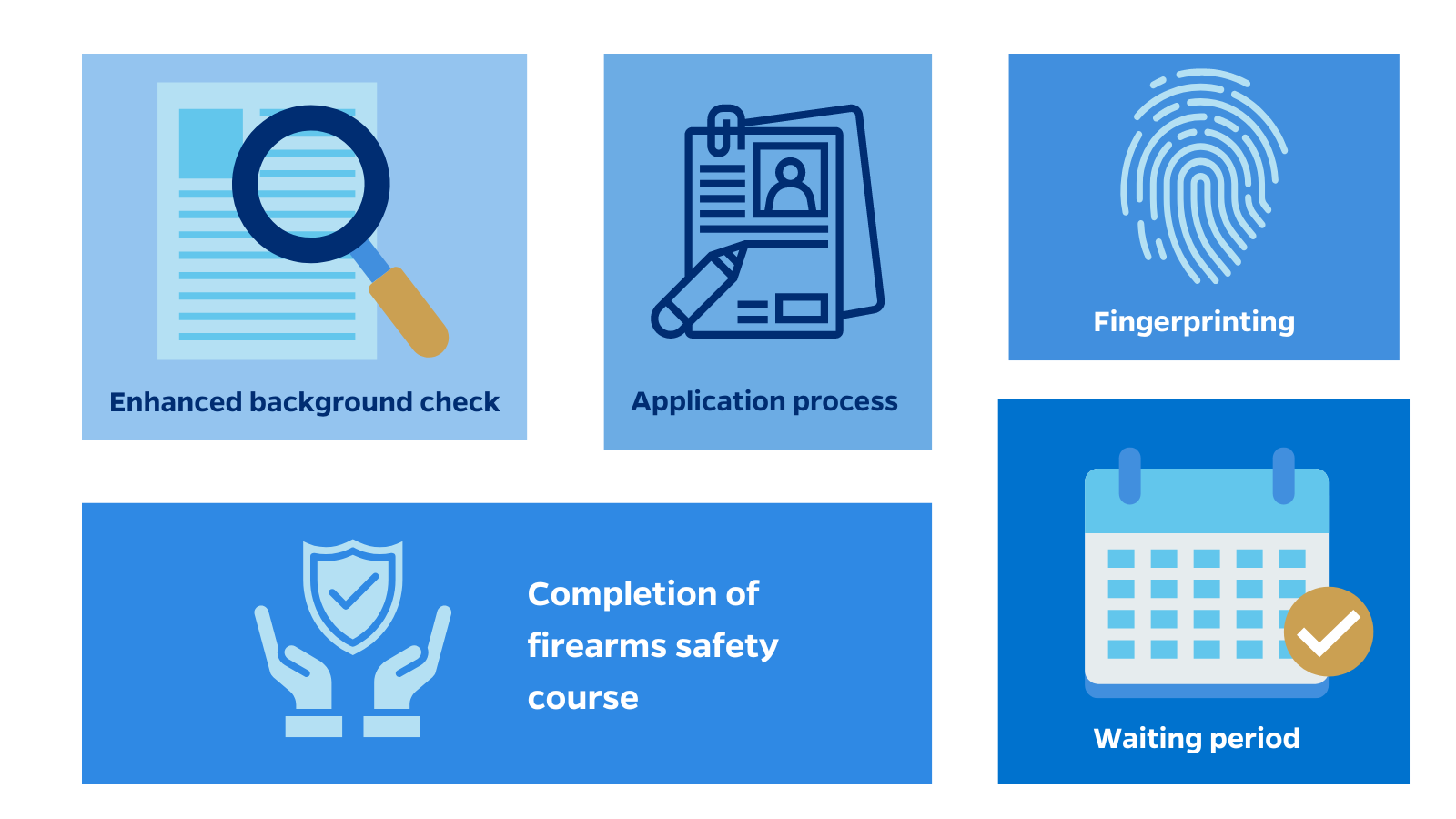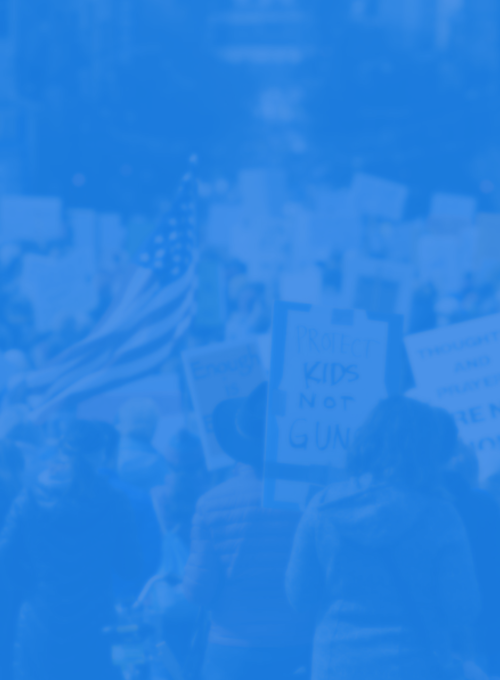
Firearm Purchaser Licensing
Firearm Purchaser Licensing laws, or permit-to-purchase, are a complement to existing background check systems. They require prospective firearm purchasers to first obtain a license. These laws are associated with lower rates of diversions of firearms for use in crime, homicide, mass shootings, suicide, and shootings by police.
The Issue
Existing loopholes in the federal background check law provide an avenue for individuals who are prohibited from owning a firearm to purchase one. Private sales, gun shows, online marketplaces, and delayed background checks contribute to thousands of prohibited persons acquiring firearms each year.
Universal state background checks are necessary for closing many of these loopholes, but research shows that these laws alone are not linked to reductions in violence. Further enhancements are needed to prevent people who are prohibited from purchasing a firearm and traffickers from acquiring multiple firearms they might then sell in other states. Additionally, universal background checks do not provide a waiting period that may allow individuals in crisis to purchase a firearm on the spot. Both suicide and homicide can result from impulsive thoughts or actions. Putting time and space between a firearm and a person who is at risk of harming self or others can reduce the likelihood that someone may use that firearm in a time of crisis.
The Solution

Firearm Purchaser Licensing laws enhance universal background checks by requiring fingerprinting, a more thorough background check using local records, and a built-in waiting period. The additional components play a vital role in preventing people with a history of violence, those at risk for future interpersonal violence or suicide, and traffickers from obtaining firearms.
Acquiring Firearm Purchaser Licensing typically requires the applicant to apply for a license through local or state law enforcement, undergo a thorough background check (often facilitated by fingerprints), and complete a firearm safety training course.
Research shows that Firearm Purchaser Licensing laws are one of the most effective ways to reduce many forms of firearm injury + death including homicides and suicides.

Firearm Purchaser Licensing: Research Evidence to Inform State Policy
Read the report produced by experts at the Center for Gun Violence Solutions and Consortium for Risk-Based Firearm Policy. Learn about what firearm purchaser licenses are, research on the effectiveness of FPLs, and policy recommendations to help better implement these laws across the United States.
The Evidence
Faculty at the Center for Gun Violence Solutions have conducted a series of studies examining the effect of Firearm Purchaser Licensing laws.1,2
Connecticut firearm licensing law associated with fewer firearm deaths.
Connecticut’s purchaser licensing law was associated with significant reductions in rates of firearm homicide and firearm suicide. The most recent study estimates Connecticut’s law reduced firearm homicide rates by 28 percent and firearm suicide rates by 33 percent over a 22-year period.
Repeal of Missouri’s firearm licensing law associated with more firearm deaths.
The repeal of Missouri’s purchaser licensing law was associated with an increase in rates of firearm homicides by 47 percent and firearm suicide rates by 23 percent from 2007 to 2016.3
Firearm Purchaser Licensing protects law enforcement.
Another study found evidence that these changes in firearm purchaser licensing laws were linked to lower rates of fatal shootings of police officers in Connecticut and higher rates of nonfatal shootings of police in Missouri.4
Lower rates of mass shootings in states with strong licensing laws.
States with strong firearm purchaser licensing laws were associated with 56 percent lower rates of fatal mass shooting incidents, and 67 percent fewer mass shooting victims.5
Reduction in urban gun violence.
Firearm purchaser licensing laws were associated with an 11 percent reduction in firearm homicides in urban counties from 1984-2015.6
Reduction in gun diversion.
Firearm purchaser licensing laws are also associated with significantly lower rates of firearms being diverted for criminal use shortly after retail sale.7
Firearm Purchaser Licensing
Firearm Purchaser Licensing, or permit-to-purchase laws, require an individual to apply for and obtain a license before purchasing a firearm. In most states with this policy, the process includes submitting an application to state or local police, getting fingerprinted, undergoing a comprehensive background check, and often involves safety training requirements.
GO IN-DEPTH ON FIREARM PURCHASER LICENSING
Our Work
The Center plays a pivotal role in evaluating the impacts of Firearm Purchaser Licensing laws. We have published numerous peer-reviewed journal articles finding that Firearm Purchaser Licensing laws are consistently an effective solution to reduce homicide, suicide, shootings of law enforcement officers, and intimate partner homicide.
Our advocacy team has been instrumental in passing Firearm Purchaser Licensing laws and continues to push for this evidence-based policy in states across the country. Following the passage of legislation, the Center’s advocacy team stays engaged to ensure the law is successfully implemented.
“Requiring a license or permit to purchase a handgun reduces firearm homicides and suicides, as well as trafficking and shootings of law enforcement officers. It is one of the most effective policies we have to reduce gun violence.”
Cassandra Crifasi, PhD '14, MPH, Co-director
Firearm Purchaser Licensing Factsheet
Five Firearm Purchaser Licensing Policy Recommendations
The Center's Co-director, Cass Crifasi, PhD '14, MPH, details five core policy recommendations to maximize public health benefits using Firearm Purchaser Licensing.

Q&A
Co-director Cassandra Crifasi, PhD '14, MPH, answers frequently asked questions about Firearm Purchaser Licensing as new laws are considered in several states across the country including Delaware, Washington, and Virginia, and a law passed by Oregon in 2022 is being litigated. Currently, 10 states and the District of Columbia have some form of Firearm Purchaser Licensing in place.
READ THE Q&A
Related Journal Articles
-
Crifasi CK, Ward J, McCourt AD, Webster D, & Doucette ML. (2023). The association between permit-to-purchase laws and shootings by police. Injury Epidemiology.
-
McCourt AD, Crifasi CK, Stuart EA, Vernick JS, Kagawa RMC, Wintemute GJ, & Webster DW. (2020). Purchaser licensing, point-of-sale background check laws, and firearm homicide and suicide in 4 US states, 1985-2017. American Journal of Public Health.
-
Hasegawa RB, Webster DW, & Small DS. (2019). Evaluating Missouri's handgun purchaser law: A bracketing method for addressing concerns about history interacting with group. Epidemiology.
-
Hasegawa RB, Webster DW, & Small DS. (2019). Bracketing in the Comparative Interrupted Time-Series Design to Address Concerns about History Interacting with Group: Evaluating Missouri's Handgun Purchaser Law. Epidemiology.
-
Crifasi CK, Merrill-Francis M, McCourt A, Vernick JS, Wintemute GJ, & Webster DW. (2018). Correction to: Association between firearm laws and homicide in urban counties. Journal of Urban Health.
-
Crifasi CK, Merrill-Francis M, McCourt A, Vernick JS, Wintemute GJ, & Webster DW. (2018). Association between Firearm Laws and Homicide in Urban Counties. Journal of Urban Health.
-
Crifasi CK, Buggs SAL, Choksy S, & Webster DW. (2017). The initial impact of Maryland’s firearm safety act of 2013 on the supply of crime handguns in Baltimore. RSF: The Russell Sage Foundation Journal of the Social Sciences.
-
Crifasi CK, Pollack KM, & Webster DW. (2016). Effects of state-level policy changes on homicide and nonfatal shootings of law enforcement officers. Injury Prevention.
-
Crifasi CK, Meyers JS, Vernick JS, & Webster DW. (2015). Effects of changes in permit-to-purchase handgun laws in Connecticut and Missouri on suicide rates. Preventive Medicine.
-
Rudolph KE, Stuart EA, Vernick JS, & Webster DW. (2015). Association Between Connecticut's Permit-to-Purchase Handgun Law and Homicides. American Journal of Public Health.
-
Webster D, Crifasi CK, & Vernick JS. (2014). Erratum to effects of the repeal of Missouri's handgun purchaser licensing law on homicides. Journal of Urban Health.
-
Webster D, Crifasi CK, & Vernick JS. (2014). Effects of the repeal of Missouri's handgun purchaser licensing law on homicides. Journal of Urban Health.
Citations
1. Webster D, Crifasi CK, & Vernick JS. (2014). Effects of the repeal of Missouri’s handgun purchaser licensing law on homicides. Journal of Urban Health.
2. Crisafi CK, Meyers JS, Vernick JS, and Webster DW. (2015). Effects of changes in permit-to-purchase handgun laws in Connecticut and Missouri on suicide rates. Preventive Medicine.
3. McCourt A, Crifasi CK, Vernick JS, Kagawa R, Wintemute G & Webster DW. (2020). Purchaser licensing, point-of-sale background check laws, and firearm homicide and suicide in 4 US states, 1985-2017. American Journal of Public Health.
4. Crifasi CK, Pollack KM, Webster DW.(2016). Effects of state-level policy changes on homicide and nonfatal shootings of law enforcement officers. Injury Prevention.
5. Webster DW, McCourt AD, Crifasi CK, Booty MD & Stuart EA. (2020) Evidence concerning the regulation of firearms design, sale, and carrying on fatal mass shootings in the United States. Criminology & Public Policy.
6. Crifasi CK, Merrill-Francis M, McCourt A, Vernick JS, Wintemute GJ & Webster DW. (2018). Correction to: Association between firearm laws and homicide in urban counties. Journal of Urban Health.
7. Crifasi CK, Buggs SA, Choksy S & Webster DW.(2017). The initial impacts of Maryland’s Firearm Safety Act of 2013 on the supply of crime handguns in Baltimore. The Russel Sage Foundation Journal of the Social Sciences.

